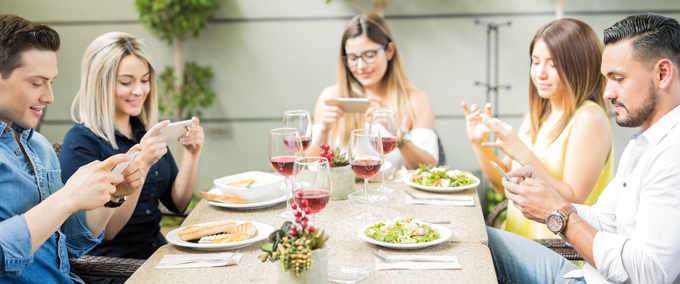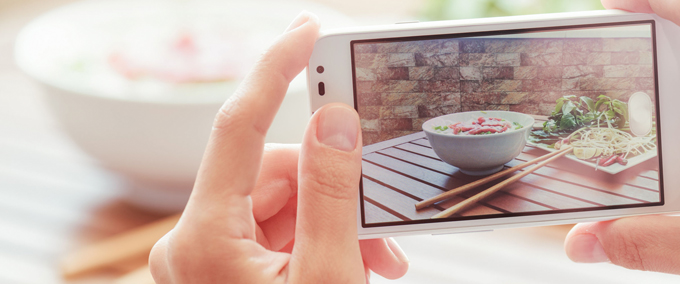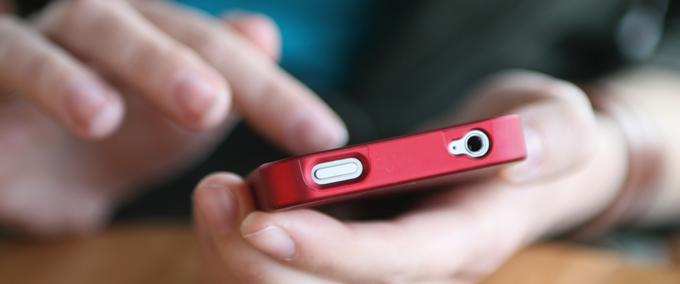I want to receive new articles by email
Are We Addicted To Smartphones?
By Jerry Brownstein
You’ve seen it many times: A group of friends or a family take their seats in a restaurant, and one by one they pull out their smartphones until the food comes. They then take pictures of the food, and continue to check their phones repeatedly whilst eating. Another common sight is people scrolling their phones and paying little attention to their surroundings when walking on busy streets, riding bicycles or even driving cars! These scenarios have become the clichés of our dysfunctional relationship with technology. Yet most people are only vaguely aware that being so connected to their phones is actually a form of addiction... an addiction that disconnects them from what’s real and important in their lives. According to Nancy Colier, author of ‘The Power of Off’: “The only difference between smartphone addiction and other addictions like alcohol and drugs, is that this one is a socially accepted behaviour. The nearly universal access to smartphones, starting at ever younger ages, is transforming modern society in ways that can have negative effects on physical and mental health, neurological development and relationships... not to mention safety on our roads and sidewalks.”
Perhaps the most astounding fact is that this addiction has taken over the world in such a short amount of time. It’s hard to believe, but just seven years ago almost no one had a smartphone. The first iPhone was introduced to a few early adopters at the end of 2007, and the first android phone was sold in 2009. In 2010 only a small percentage of people had these devices... and now everyone including your grandma has one. The reason for this is pretty obvious... smartphones are amazingly brilliant. We call them ‘phones’ but in reality they are miniature computers with an incredible range of applications that far exceed the making and receiving of phone calls. The phone’s access to the internet gives you answers to just about any question you can think of in seconds, and the amazing variety of available apps are nothing short of magical. Perhaps most important is that we can instantly connect with other people through messages, voice, photos and videos.
A smartphone gives you the world in the palm of your hand, which can make your work easier and your free time infinitely more entertaining... but it is also addictive. Studies have shown that most people check their phones over 100 times a day, and young people (18 to 24) exchange an average of 110 messages per day. Over half of smartphone users say that they “couldn’t live without it”, and some said they’d give up sex rather than their phone. Several cities have installed traffic lights in the pavement so that ‘smartphone zombies’ - those who never look up from their phones - will know when to stop and not get run over. Too many of us have become slaves to the very device that was supposed to free us to have more time to experience life and the people we love. Instead, we are constantly bombarded by bells, buzzers and chimes that alert us to messages we feel compelled to immediately view and respond to. In the words of one expert on social interaction: “Most of the time when people look down at their phones they’re wasting their attention on something that doesn’t really matter.”
Here’s a short test to see if you are addicted. Do you turn on your phone the first thing in the morning or even leave it on all night? Do you take photos of your food (rather than just enjoying it)? Do you stick your phone in the air to take pictures or videos of every event that you go to (instead of fully being there)? Do you use a selfie stick? Do you look at your phone when you are walking down the street or, heaven forbid, when you are driving? These are all signs of an addiction that takes you away from real life and keeps you lost in the make-believe distractions of a tiny screen... and this addiction is no accident. Just as the tobacco companies intentionally got people hooked on nicotine to increase their business, the tech companies have clever ways of getting you hooked on clicks... because every click means more money for them.
Most apps have been specifically designed to be addictive. You are driven to check whatsapp, or messenger, or instagram, or snapchat, or send a tweet, or look to see how many ‘Likes’ you have on Facebook, etc... and each time you do the tech companies make money. It’s called ‘The Attention Economy’ because these companies are competing to get our attention. It is important to understand that we are not the customers of Facebook and the other apps. Their customers are their advertisers... and our attention is the product that they need to sell to those customers. The best way for them to keep your attention is to make you addicted to the possibility of getting a reward. Clicking on an app is like pulling the lever on a slot machine. People keep playing slots because they hope that the next pull will give them a win. In the same way, we keep checking our apps hoping to see something good - a ‘like’, a cool photo, a message, etc.. You do not always get positive feedback, but the next buzz or bell tempts you to look again because you are hooked on the possibility of getting a ‘win’. So what can one do about this addiction?
Some experts advise that moderating our digital lives is the best way to stay connected yet not be addicted. You can start by recognizing how much of your phone use is really needed for work or essential communication, and which parts are merely habits of responding, posting and distraction. Become conscious of what is really important in your life, and make changes which reflect that awareness: turn it off when you are eating... or with friends... or walking in the street. This is a sensible way to restore some balance to your life. On the other hand, you could just give it up. More than a few people are doing this, including a woman who wrote an interesting blog about her experience.
She is a graphic designer who was totally attached to her phone for both business and pleasure. Her addiction was complete, and it included constantly checking messages and social media, playing app games and even sleeping with her phone. One day she finally realized that she did not like the fact that anyone, for any reason, could interrupt her life, so she decided to stop using a smartphone. She describes her new life this way: “I got a landline and now I get more sleep. I’m less distracted and less accessible. I can’t be bothered unless I choose to be. I look people in the eye. I eat food instead of photographing it, and I’m not driving half a ton of metal into oncoming traffic while looking down at a tiny screen. It turns out that a basic internet connection with a laptop is plenty of connectivity. There are a dozen ways to contact me between email and social media, and when I check in it’s on my terms. It’s as freeing as the first night of a vacation. I’m glad to be back in the world again. It beats waiting for the next notification alert telling me that I exist.” •











